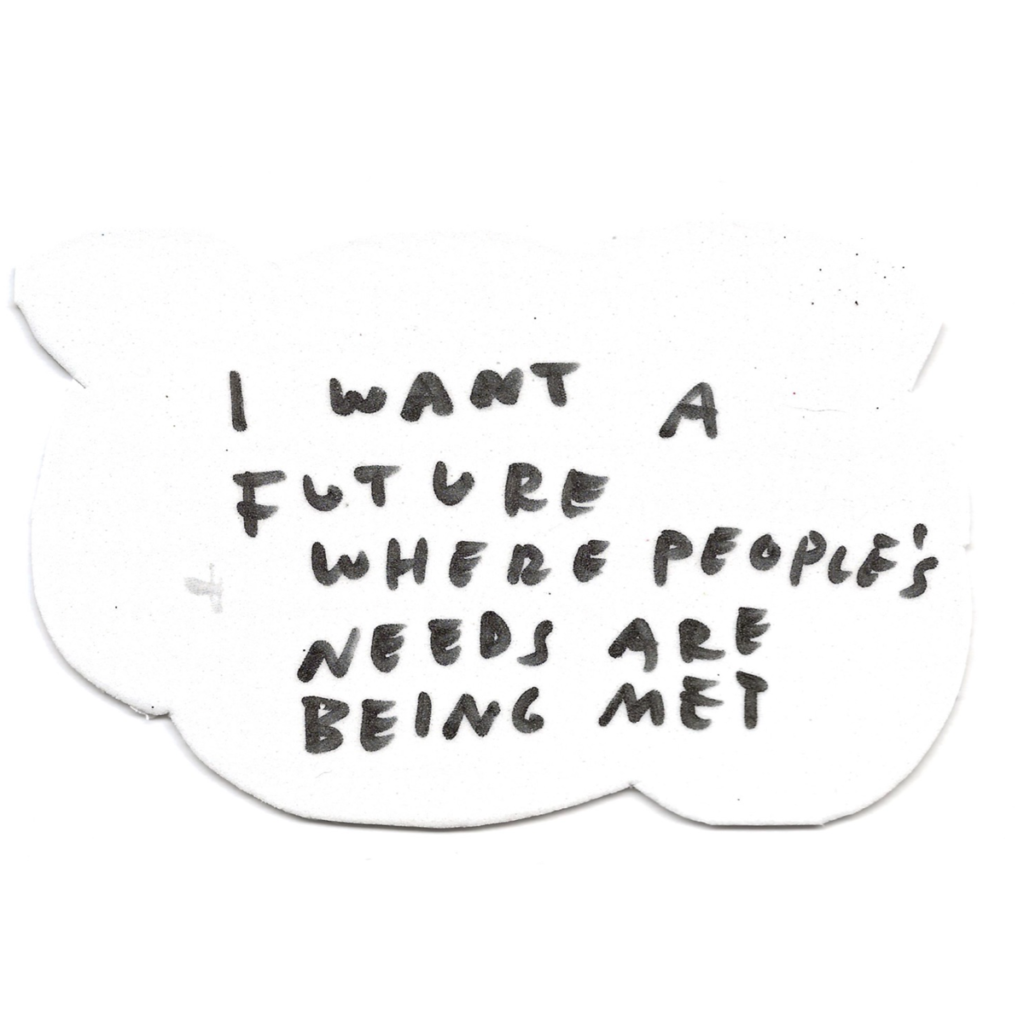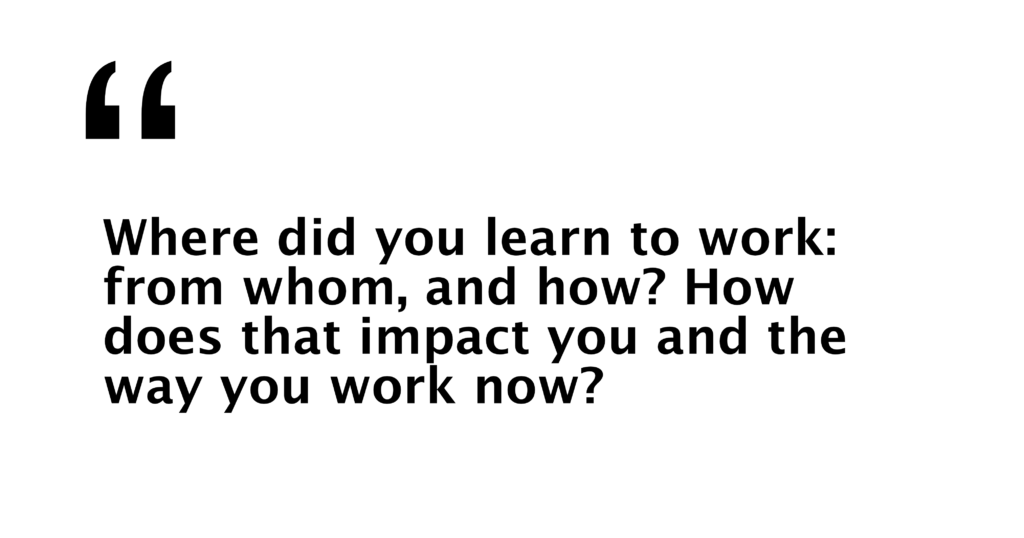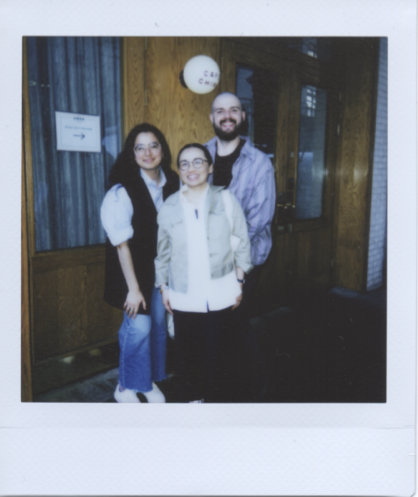Hello!
It’s a pleasure to finally be in touch since being welcomed as the new Executive Director of A Blade of Grass (aBoG). During my transition into the organization, we’ve been busy reestablishing our team, dreaming up and planning new programs, and building community with artists who are actively shifting structures of power and envisioning new ways of being in the world. I’ve felt time differently since the beginning of the pandemic—simultaneously sped up and slowed down—and increasingly so when, within a few months of joining aBoG, I had a baby. It’s been both a magical and humbling experience to become a mother while growing into my new role at aBoG. Luckily and thankfully, I get to spend my days with people I love.
Our Program and Operations Manager Ixtzel Reynoso has been with aBoG for three years and partnered with a different executive director each year with care and intention. Ixtzel is our institutional memory. She has been invaluable in stewarding this organization through a time of transition and reflection. As the youngest of our team, Ixtzel is also the wisest. We depend on her to ask the nitty gritty questions that make our ideas manifest into actual programs. Her heart and enthusiasm powers our day to day. Lee Heinemann, our Program Director, joined us in November of 2023. Lee is a dear collaborator of over a decade, a true Capricorn and the best person to build new things with. Lee possesses wide-ranging skills that have allowed him to both thoughtfully administer Artist Relief, a national emergency relief fund, and collaborate with high energy middle schoolers through Get Your Life! Productions. He continues to surprise and inspire me, most recently through a newfound love of gardening and geodesic dome home renovation. Our artist and arts worker board: ashley sparks, Brett Cook, Diya Vij, Gregory Sale, Michael Premo, and Michael Quattrone—six of the most committed collaborators, patient teachers, and earnest risk takers I know—completes our small but mighty team.
Together, we’re excited to launch aBoG’s new micro-grant program, Field Funds, the first of a trio of programs we’re piloting this year. Designed to be easily recalibrated to artists’ changing needs, the fund will disburse grants as quickly as one week after applications close. Our first open call supports practitioners to gather with their people, and applications are now open. Learn more and apply below, and please share!
As an organization, we are committed to centering artists in our work as well as demonstrating an ethics of care towards each other, our collaborators, and our partners. We are working to operationalize these values. Our organization became W.A.G.E. certified and shifted to a four day work week. We are in the process of building a team handbook to codify our approach to staff care and support. I’m thankful to our board and the shared values we carry into our work, which allow our organization to demonstrate internally what we espouse publicly. As an artist myself, it’s incredible to be part of a leadership team composed of individuals with lived experiences as socially engaged practitioners.
Our current governance structure was made possible through the leadership of aBoG’s founders, Deborah Fisher and Shelley Frost Rubin. In 2022 and with support from the historic board, they transitioned the organization from a traditional board structure to a unique new model: a paid artist and arts worker-led board. With support from powerhouse Interim Executive Director Suzy Delvalle, the then newly formed practitioner-led board immediately moved to demonstrate their values by investing in clean energy, making deposits with local credit unions, and divesting from fossil fuels, prisons, and weapons manufacturing. I’m thankful to the board for bringing me in and honored to be in their orbit as we work together to re-establish aBoG as a key contributor to an ecosystem of support for socially engaged artists today.
Since the winter of 2022, thanks to support from the Mellon Foundation and Rockefeller Brothers Fund, aBoG’s board has been in conversation with socially engaged practitioners and cultural workers across the country through a research partnership with the Center for Artistic Activism. Together, they have been exploring what socially engaged artists need now and how an organization like aBoG can most sustainably meet those needs. Gathering with and growing this community has been so rewarding and the best introduction to my role. There are so many incredible artists to highlight and people we’d love to connect to each other. In this spirit, and with Risa Puleo as our collaborator and advisor, we’ll be launching a digital publication this summer. Later this fall, we’ll be in touch to share exciting updates to our signature fellowship program, which has been on pause since the beginning of the pandemic.
Our programs have been informed by the generous contributions of 148 research participants who attended virtual sessions, gave interviews, and gathered with us in convenings in San Francisco, New Orleans, and New York City. Their insights and offerings ranged from the practical to the poetic. I am grateful for each and every note.
To continue the conversation, we invited artist Chloë Bass to create a set of questions we can pose to socially engaged practitioners of all ages and across a breadth of geography and practice. I want to share one question in particular that has animated our team’s conversations, along with our responses, as a way of introducing who we are and how we show up in our work together.
There are so many people I love and have been supported by and consider to be my teachers. I was first taught how to work by my parents in Oklahoma and learned how to rest and reframe work through conversations with disabled artists and colleagues during a global pandemic. Ezra Benus was my first partner in remote work who introduced me to resources and writings that have shifted my world view. Michael Pusey taught me care as a politic and how setting boundaries is kind. I learned to be an artist and cultural worker in Baltimore where I still live.
My parents and I immigrated to Stillwater, Oklahoma from China in the 1980s. We lived on campus housing at Oklahoma State University while my dad pursued a degree in agricultural engineering. I was four years old during a time where we didn’t understand the model minority myth and the “American dream” still seemed possible and in stark contrast to the cultural revolution we were coming out of. My parents lived a work ethic where they saw their value and potential as directly connected to their ability to exchange their labor for wages. This both instilled in me an exaggerated sense of personal responsibility that took decades to unlearn and an optimism that encouraged me to move to Baltimore to go to art school.
At that time, Baltimore provided a community of dedicated artists experienced in hacking existing systems through a DIY approach due to a lack of funding and commercial opportunities. Through Baltimore’s artist community, I was invited to join a similarly small but mighty team led by Deana Haggag to relaunch The Contemporary, a nomadic non-collecting museum. Inspired by our three guiding principles of artists matter, collaboration is key, and audience is everywhere, the work was incredibly collaborative in design and implementation and, as we were all new to our roles, unhindered by standard practices. This experience revealed the kind of work culture and organizational structure I most value, an ethos I carried into my next role at United States Artists (USA), a national arts funder headquartered in Chicago. At USA, I had the opportunity to build real pragmatic infrastructures through partner initiatives and coalition efforts such as Disability Futures and Artist Relief. Disability Futures, a fund to spotlight and amplify the work of disabled creatives, taught me the importance of designing a flexible disbursement process that could pay artists nimbly to mitigate harm. Artist Relief, an intensive coalition effort to provide emergency relief grants to artists during the onset of the COVID-19 crisis, underscored the precarity of artists’ lives. Knowing the scale of need, I am now even more committed to actively and tangibly redistributing resources, both through traditional and nontraditional avenues, and to doing so in collaboration and through coalition building. To this day, the necessary scrappiness and nimbleness of my early days in Baltimore informs how I work.
I’d like to invite my co-conspirators Ixtzel and Lee to answer Chloë’s question, and I hope you’ll also join us in reflecting on its relevance to your own practice of work (and rest): Where did you learn to work, from whom, and how? How does that impact you and the way you work now?
Warmly,
Lu Zhang
Executive Director
Our staff answers a question Chloë Bass conceived for our upcoming publication!
“I learned how to work from so many people!!! I come from a family of immigrants who instilled in me a dedication to work, but I think my dad gave me a method for how to work. When I started music lessons, he spent a lot of time teaching me how to take a piece, assess it as a whole, and then work through it note by note, measure by measure until I got through it. I learned to play when I was really young, so at the time, this method was tedious, but it taught me how to sit with something that could be confusing at first glance and gave me a method to work through it. Now I work through budgets and contracts in that same manner.
As culture workers, all of aBoG’s Executive Directors have shaped who I am and who I aspire to be. I learned the value of appreciating challenges and engaging in them with curiosity and dedication from my time working with Deborah Fisher. Suzy Delvalle modeled an approach to work filled with deep love and joy. And Lu Zhang has taught me new ways of being rigorous, generous, and caring. Witnessing these three Executive Directors steer this ship through an intense transition has been an incredible and formative experience.”
-Ixtzel Reynoso, Program and Operation Manager
“I continue to learn to work from working. I am grateful that I keep having opportunities to explore my curiosities, and collaborators to figure things out with.
My first collaborator was my childhood (and current day) best friend, Cheyenne. I was videographer to her character actress in our preteen DIY movie studio. We didn’t know other kids who shared our interests, and I ended up intensely curious about people who made things and how that all works.
In the time since, I’ve worked with practicing artists in their studios, on their projects in institutions and public spaces, and on their initiatives to organize or support others. I’ve worked with nonprofits to commission and present work, give artists awards and grants, and administer emergency relief. And, I’ve worked with museums as the artist presenting my collaborative work, education programs, and events.
Experiencing this world from many angles, I have a growing understanding of the challenges artists overcome to make and share their work, and what structures exist to support them. Deana Haggag and Lu Zhang gave me my first real job at The Contemporary, and I’ve been privileged to follow them to a number of roles, working in support of artists since. They teach me how to navigate and work the systems we have to make a world that takes better care of artists and workers.
I have also been privileged to work with middle and high school students to create collaborative projects and explore their independent visions. They teach me how to be authentic throughout my work.”
-Lee Heinemann, Program Director



